Holistic Treatment for Kidney Stones
Kidney stones treatment
The kidney stones treatment approach depends on the type of stone, how bad it is, and the length of time you have had symptoms. There are different treatments for kidney stones to choose from. It is important to talk to your health care provider about what is best for you.

Below are different approaches to treatment for kidney stones:
Medications for kidney stones
Medications for kidney stones represent one of the treatments for kidney stones that have been shown to improve the chance that a stone will pass. The most common medication for kidney stones is tamsulosin. Tamsulosin (Flomax) relaxes the ureter, making it easier for the stone to pass. You may also need pain and anti-nausea medicine as you wait to pass the stone.
Surgery for kidney stones
Surgery for kidney stones is another kidney stones treatment that may be needed to remove a stone from the ureter or kidney if:
- The stone fails to pass.
- The pain is too severe for the stone to pass.
The stone is affecting kidney function. Small stones in the kidney may be left alone if they are not causing pain or infection. Some people choose to have their small stones removed. They do this because they are afraid the stone will unexpectedly start to pass and cause pain.
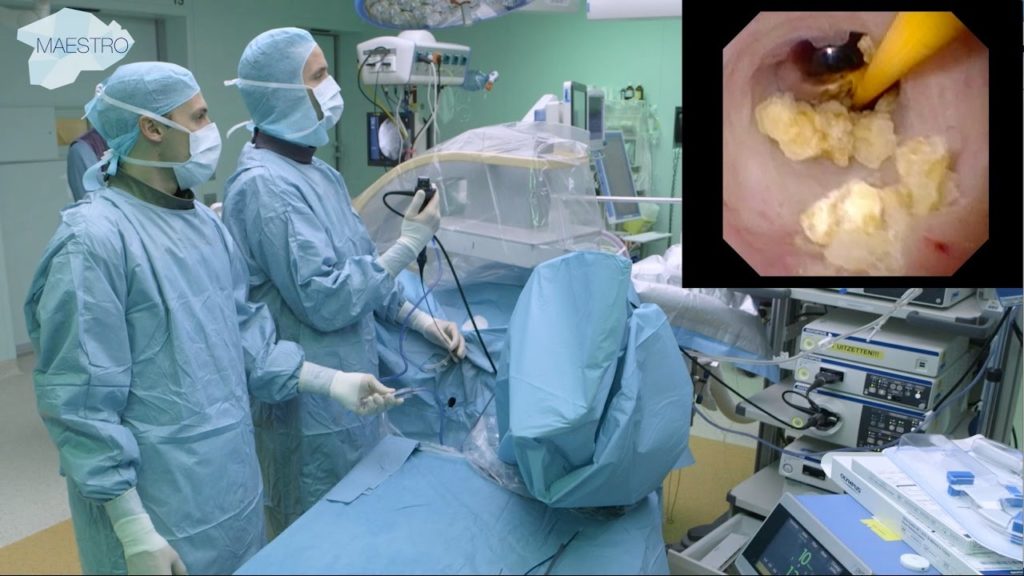
Kidney stones should be removed by surgery if they cause repeated infections in the urine or because they are blocking the flow of urine from the kidney. Today, surgery usually involves small or no incisions (cuts), minor pain, and minimal time off work.
Surgeries to remove stones in the kidneys or ureters are:
Laser surgery for kidney stones
Laser surgery for kidney stones or laser lithotripsy is another known treatment for kidney stones. It uses a laser to break the stones into very small pieces. These pieces can be removed during the procedure. Or they may pass out of the body in the urine.
Percutaneous nephrolithotomy (PCNL)
Percutaneous Lithotripsy (PCNL) is the best treatment for large stones in the kidney. General anesthesia is needed to do a PCNL. PCNL involves making a half-inch incision (cut) in the back or side, just large enough to allow a rigid telescope (nephroscope) to be passed into the hollow center part of the kidney where the stone is located.
Other surgery for kidney stones
Another kidney surgery is rarely used to remove stones. Open, laparoscopic, or robotic surgery may be used only if all other less invasive procedures fail.
Note: Another treatment for kidney stones that have shown its effectiveness is the natural remedies for kidney stones
What is a kidney stone?
Each year, more than half a million people go to emergency rooms for kidney stone problems. It is estimated that one in ten people will have a kidney stone at some time in their lives.
The prevalence of kidney stones in the United States increased from 3.8% in the late 1970s to 8.8% in the late 2000s. The prevalence of kidney stones was 10% during 2013–2014. The risk of kidney stones is about 11% in men and 9% in women. Other diseases such as high blood pressure, diabetes, and obesity may increase the risk for kidney stones.
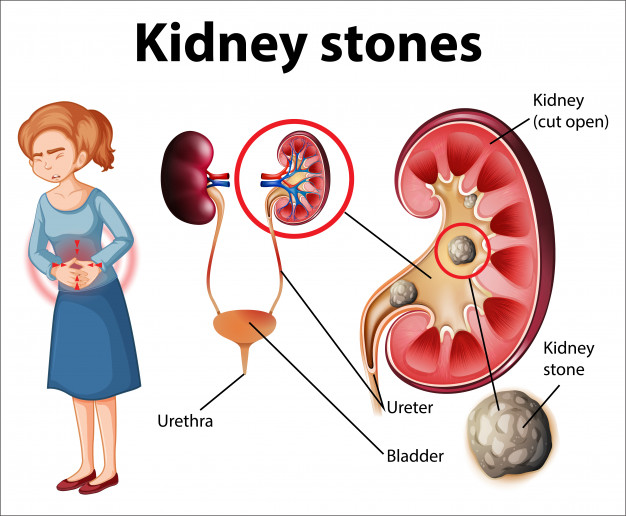
A kidney stone is a hard object that is made from chemicals in the urine. There are four types of kidney stones: calcium oxalate, uric acid, struvite, and cystine. A kidney stone may be treated with shockwave lithotripsy, ureteroscopy, percutaneous nephrolithotomy, or nephrolithotripsy. Common symptoms include severe pain in the lower back, blood in your urine, nausea, vomiting, fever, and chills, or urine that smells bad or looks cloudy.
Urine has various wastes dissolved in it. When there is too much waste in too little liquid, crystals begin to form. The crystals attract other elements and join together to form a solid that will get larger unless it is passed out of the body with the urine. Usually, these chemicals are eliminated in the urine by the body’s master chemist: the kidney. In most people, having enough liquid washes them out or other chemicals in urine stop a stone from forming. The stone-forming chemicals are calcium, oxalate, urate, cystine, xanthine, and phosphate.
After it is formed, the stone may stay in the kidney or travel down the urinary tract into the ureter. Sometimes, tiny stones move out of the body in the urine without causing too much pain. But stones that don’t move may cause a back-up of urine in the kidney, ureter, bladder, or urethra. This is what causes the pain.
Types of kidney stones
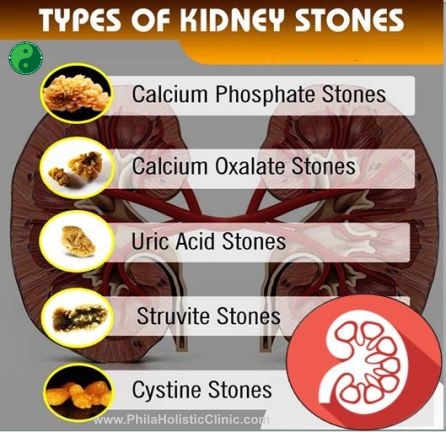
There are four main types of kidney stones:
Calcium oxalate:
The most common type of kidney stone is created when calcium combines with oxalate in the urine. Inadequate calcium and fluid intake, as well other conditions, may contribute to their formation.
Uric acid:
This is another common type of kidney stone. Foods such as organ meats and shellfish have high concentrations of a natural chemical compound known as purines. High purine intake leads to a higher production of monosodium urate, which, under the right conditions, may form stones in the kidneys. The formation of these types of stones tends to run in families.
Struvite:
These stones are less common and are caused by infections in the upper urinary tract.
Cystine:
These stones are rare and tend to run in families.
Causes of kidney stones
Possible causes of kidney stones include drinking too little water, excessive or insufficient exercising (too much or too little), obesity, and weight loss surgery. Eating too much fructose correlates with an increased risk of developing a kidney stone. Fructose can be found in table sugar and high fructose corn syrup.
Below are other causes of kidney stones:
Low Urine Volume
A major risk factor for kidney stones is constant low urine volume. Low urine volume may come from dehydration (loss of body fluids) from hard exercise, working or living in a hot place, or not drinking enough fluids. When urine volume is low, urine is concentrated and dark in color. Concentrated urine means there is less fluid to keep salts dissolved. Increasing fluid intake will dilute the salts in your urine. By doing this, you may reduce your risk of stones forming.
Adults who form stones should drink enough fluid to make at least 2.5 liters (⅔ gallon) of urine every day. On average, this will take about 3 liters (100 ounces) of fluid intake per day. While water is likely the best fluid to drink, what matters most is getting enough fluid.
Bowel Conditions
Certain bowel conditions that cause diarrhea (such as Crohn’s Disease or ulcerative colitis) or surgeries (such as gastric bypass surgery) can raise the risk of forming calcium oxalate kidney stones. Diarrhea may result in loss of large amounts of fluid from the body, lowering urine volume. Your body may also absorb excessive oxalate from the intestine, resulting in more oxalate in your urine. Both low urine volume and high levels of urine oxalate can help to cause calcium oxalate kidney stone formation.
Medical
Some medical conditions have an increased risk of kidney stones. Abnormal growth of one or more of the parathyroid glands, which control calcium metabolism, can cause high calcium levels in the blood and urine. This can lead to kidney stones. Another condition called distal renal tubular acidosis, in which there is acid build-up in the body can raise the risk of calcium phosphate kidney stones.
Some rare, inherited disorders can also make certain types of stones more likely. Examples include cystinuria, which is too much of the amino acid cystine in the urine, and primary hyperoxaluria, in which the liver makes too much oxalate.
A side effect of some medications
Some medications, and calcium and vitamin C supplements, may increase your risk of forming stones. Be sure to tell your health care provider all the medications and supplements you take, as these could affect your risk of stone formation. Do not stop taking any of these unless your health care provider tells you to do so.
Family History
The chance of having kidney stones is much higher if you have a family history of stones, such as a parent or sibling.
Symptoms of kidney stones
Common symptoms of kidney stones include sharp, cramping pain in the back and side. This feeling often moves to the lower abdomen or groin. The pain often starts suddenly and comes in waves. It can come and go as the body tries to get rid of the stone.
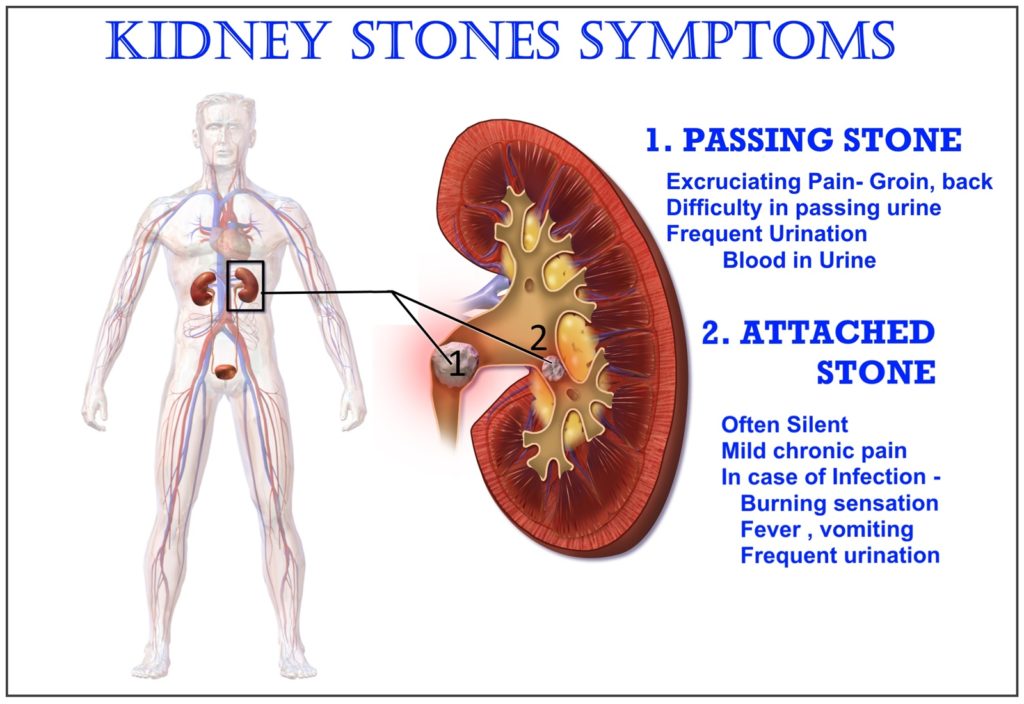
Other symptoms of kidney stones include:
- A feeling of intense need to urinate.
- Urinating more often or a burning feeling during urination.
- Urine that is dark or red due to blood. Sometimes urine has only small amounts of red blood cells that can’t be seen with the naked eye.
- Nausea and vomiting.
- For men, you may feel pain at the tip of the penis.
The kidney stone starts to hurt when it causes irritation or blockage. This builds rapidly to extreme pain. In most cases, kidney stones pass without causing damage-but usually not without causing a lot of pain. Pain relievers may be the only treatment needed for small stones. Other treatment may be needed, especially for those stones that cause lasting symptoms or other complications. In severe cases, however, surgery may be required.
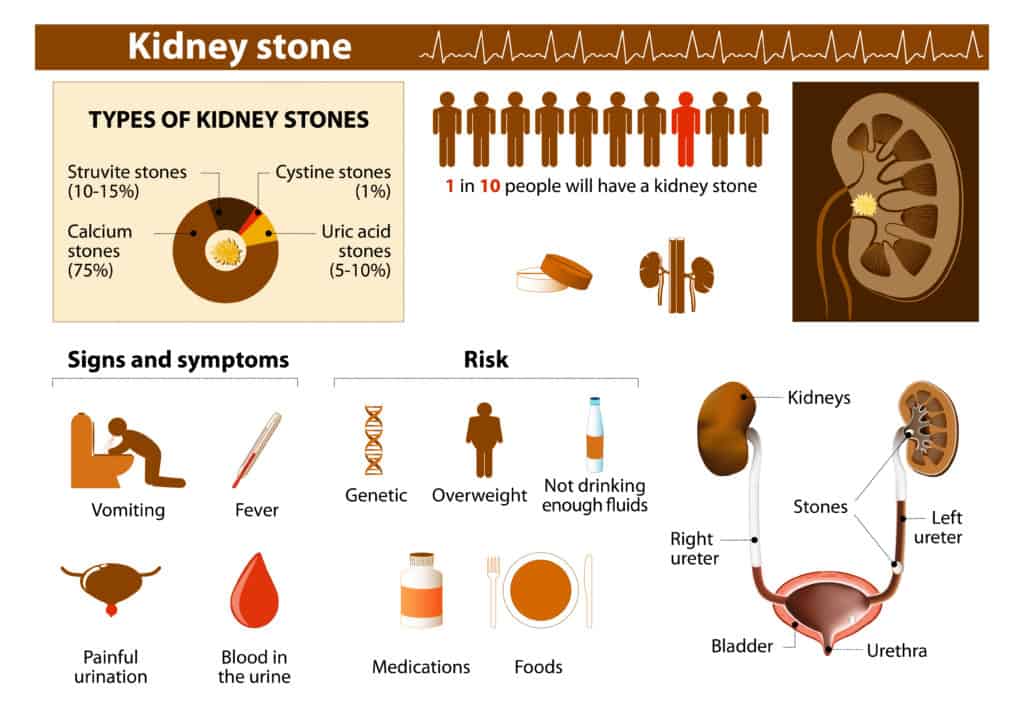
Natural remedies for kidney stones
Natural remedies for kidney stones are a natural treatment that has been proven to be effective with little or no side effects. Below are natural remedies for kidney stones:
Home remedies for kidney stones – most popular kidney stones treatment
Home remedies for kidney stones are natural remedies for kidney stones that can be easily achieved at home without side effects. Below are home remedies for kidney stones:
Water
Water is one of the home remedies for kidney stones. When passing a stone, upping your water intake can help speed up the process. Strive for 12 glasses of water per day instead of the usual 8.
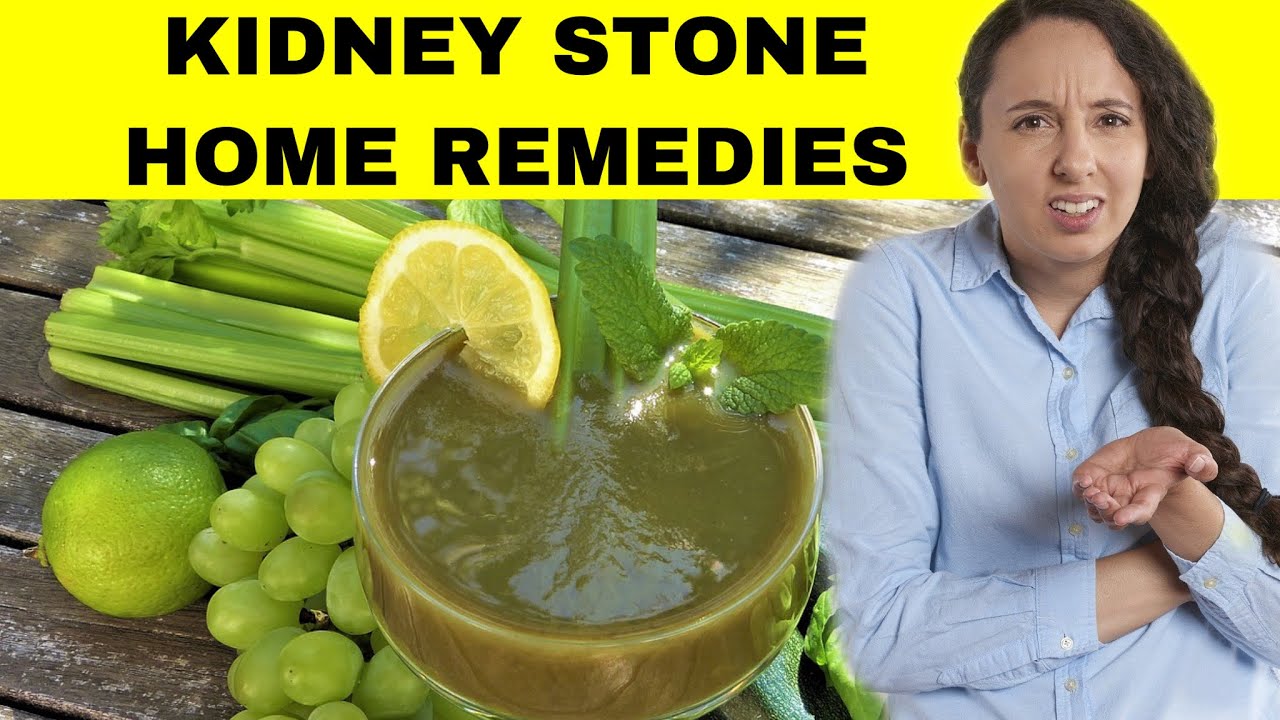
Lemon juice
You can add freshly squeezed lemons to your water as often as you like. Lemons contain citrate, which is a chemical that prevents calcium stones from forming. Citrate can also break up small stones, allowing them to pass more easily.
Basil juice
Basil contains acetic acid, which helps break down kidney stones and reduce pain. It’s also full of nutrients. This remedy has been used traditionally for digestive and inflammatory disorders.
Apple cider vinegar
Apple cider vinegar contains acetic acid. Acetic acid helps dissolve kidney stones. In addition to flushing out the kidneys, apple cider vinegar can help ease the pain caused by the stones. There are numerous other health benefits of apple cider vinegar.
Diet
Diet for kidney stones is an essential component of any kidney stones treatment that reduces the risk of recurrence if they have already had stones should follow these main steps:
- Drink plenty of water
- Limit their intake of salt and animal protein
- Restrict foods that contain high levels of oxalates
- Get enough calcium
There is no single diet plan for all types of kidney stones, as they can form due to a buildup of several different minerals in the body. However, many dietitians and doctors who specialize in kidney diseases, or nephrologists, recommend the Dietary Approaches to Stop Hypertension (DASH) for people with kidney stones.
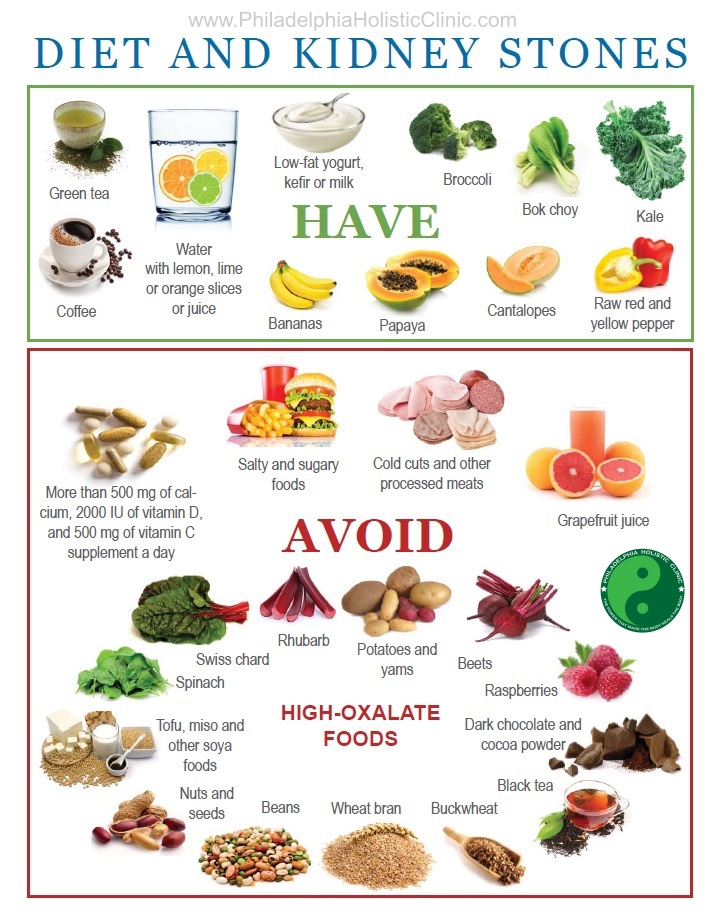
This diet for kidney stones has demonstrated the ability to reduce the risk of kidney stone formation and improve other elements of overall health, such as lower blood pressure and a reduced risk of heart disease, stroke, and cancer.
Herbs for kidney stones – effective and safe kidney stones treatment
The use of herbs for kidney stones is another method of natural treatment for kidney stones that are effective. Listed below are the two most common herbal remedies for kidney stones:
Dandelion root juice
Dandelion root is an herb for kidney stones that help eliminate waste, increase urine output, and improve digestion. Dandelions have vitamins (A, B, C, D) and minerals such as potassium, iron, and zinc.
Horsetail
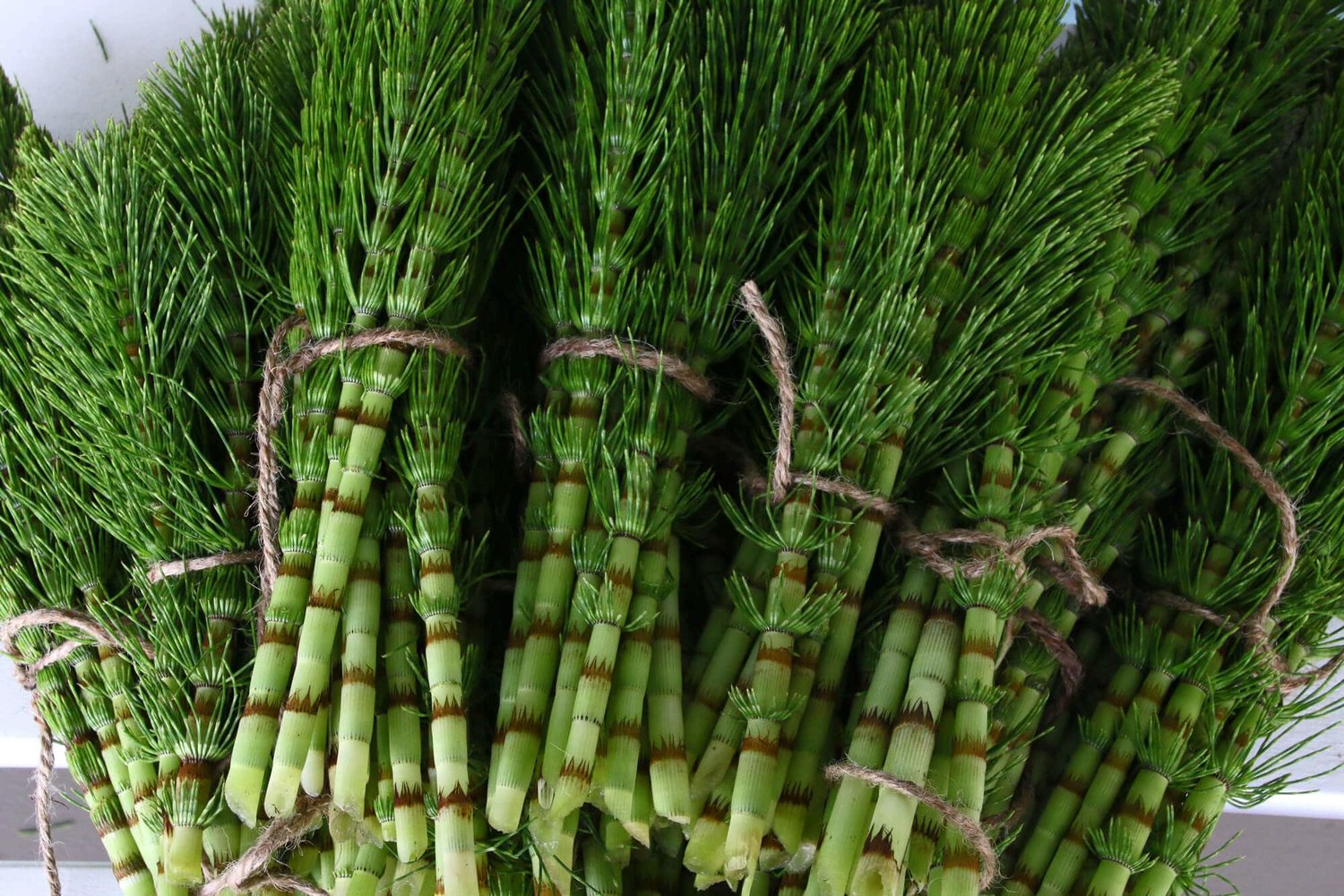
Horsetail is another herbal remedy for kidney stones that have been used to increase urine flow to help to flush out kidney stones and can soothe swelling and inflammation. It also has antibacterial and antioxidant properties that aid in overall urinary health.
Acupuncture for kidney stones – an ancient Chines natural kidney stones treatment
Acupuncture for kidney stones is another natural treatment for kidney stones that helps to promote energy flow along the affected acupuncture meridians, thereby inducing urination, relieving strangury (straining to produce even small volumes of urine in spasmodic “dribbles”), and shrinking and eventually allowing the stones to pass.
The main target of acupuncture for kidney stones is to stimulate the flow of Qi energy along the affected acupuncture meridians, thereby inducing urination, relieving strangulation (strive to produce even small volumes of spasmodic “dribbling” urine), and shrinking and eventually allowing stones to form. past.
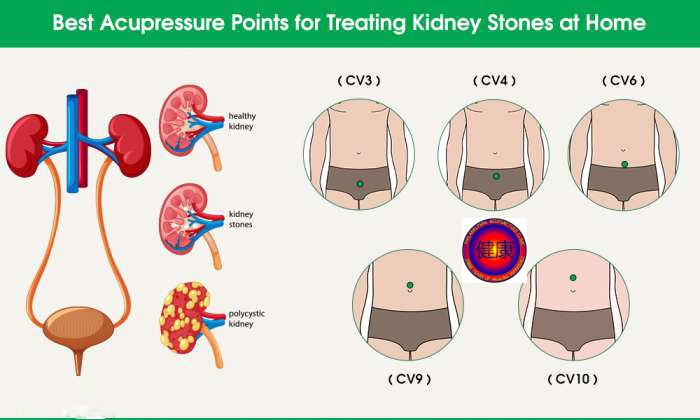
Applying electric currents to the acupuncture needles can increase the stimulation along the meridian, letting the kidney stones flow down the ureter.
Ear acupuncture aka auricular therapy is more effective for some sorts of kidney stones.
Dr. Peter Sheng – a specialist in internal medicine, hematology, and oncology found in his practice that “acupuncture is a good alternative to the wonderful equipment and technology of modern medicine. Especially for those who don’t respond well at the beginning, those who don’t can afford these procedures, and especially those who have constitutional problems, for example, for seniors with significant fatigue who may not be good candidates for Western procedures.”
Homeopathy for kidney stones – #1 natural treatment for kidney stones.
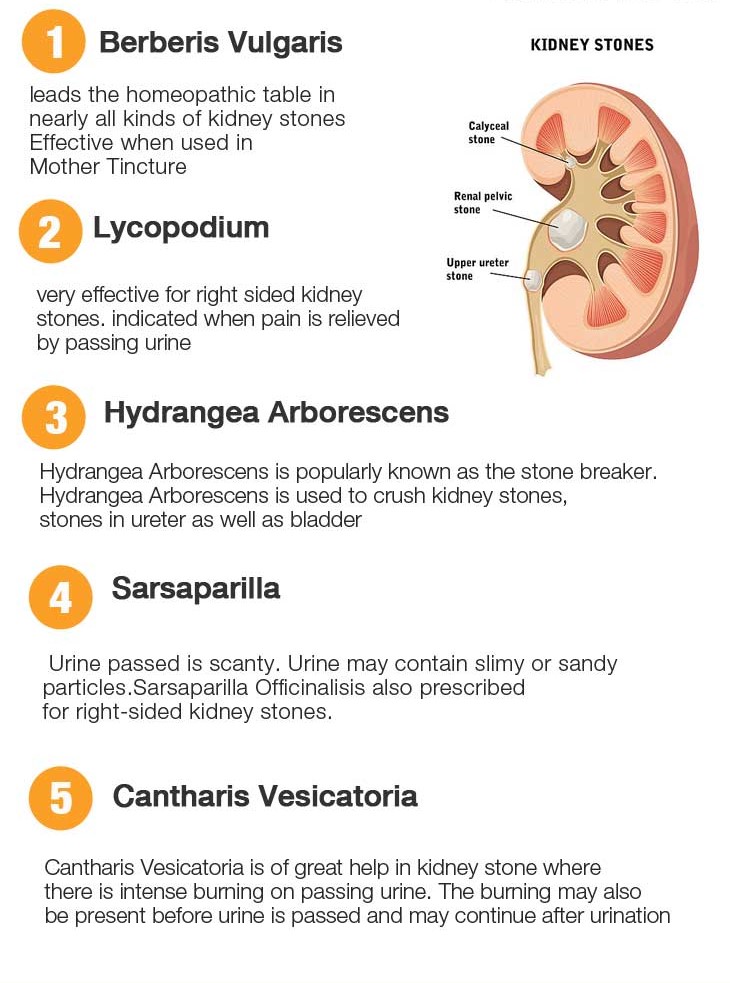
Homeopathy for kidney stones is a form of natural treatment for kidney stones that helps in the passage of stones as well as in relieving the agonizing pain caused by the same. Below are the most common and effective homeopathic remedies for kidney stones:
Berberis is commonly used to treat kidney stones or kidney stones. It is also used to relieve abdominal pain caused by kidney stones. It also helps in improving the function of the kidneys and thus helps with treatment.
This homeopathic remedy for kidney stone is ideal when there is sharp, shooting pains. Pain comes suddenly, crampy straining along the ureter, during the passage of calculus. Feverish and excitable.
This homeopathic remedy is used in case the patient is suffering from nephritic colic with offensive urine. The urine is dark red in color and has a strong odor. It can smell putrid, urine is thick and clear like water in an alternate way. This homeopathic remedy for kidney stones is used when urine is alternately thick like pea-soup.
This homeopathic remedy for kidney stones is ideal for very large stones. It helps to break them.
Holistic treatment in Philadelphia
Kidney stones require oppressional medical care. DO NOT treat kidney stones with alternative therapies by yourself. Holistic treatment for kidney stones would be effective and safe only if prescribed and performed under the supervision of a specialist. Alternative therapies can help reduce the risk of recurring episodes and increase the overall vitality of the genitourinary system. Start with the nutritional guidelines for relapse prevention. Herbs and homeopathic remedies can be used for acute pain relief and long-term firming of the urinary tract if used under the guidance of an experienced healthcare professional. Always discuss with your medical provider the herbs and supplements you are taking.
For professional help and natural kidney stones treatment contact Philadelphia Homeopathy Clinic and schedule an appointment with Dr. Tsan. Ask which of natural treatments is the best for you and receive a prescription.
For an appointment, contact our clinic (215) 621-8485 or scan the QR code below.

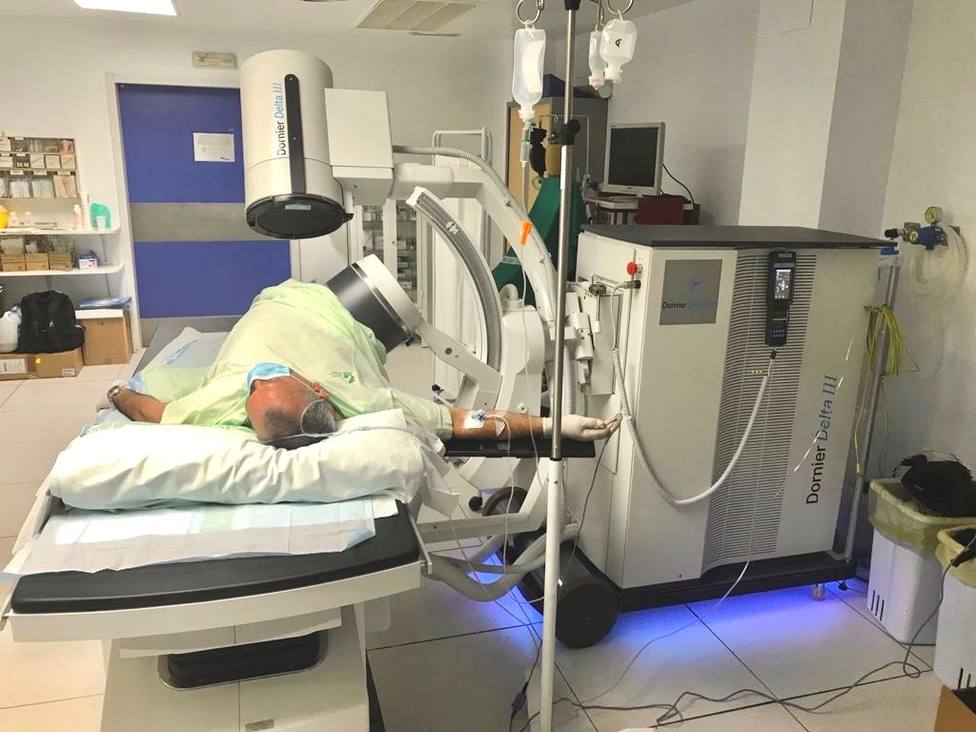
Comments
Post a Comment